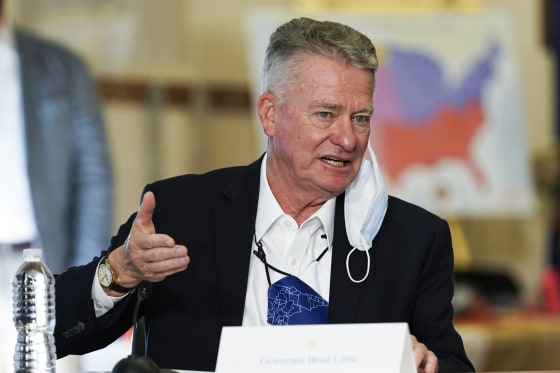Idaho Lt. Gov. Janice McGeachin issued a sweeping executive order Tuesday while Gov. Brad Little was out of state banning so-called vaccine passports for schools and universities — an order Little repealed Wednesday.
"Today, as Acting Governor, I fixed Gov. Little's Executive Order on 'vaccine passports' to make sure that K-12 schools and universities cannot require vaccinations OR require mandatory testing. I will continue to fight for your individual Liberty!" tweeted McGeachin, who is elected separately from Little and is running to take her fellow Republican's job next year under the campaign slogan "Make Idaho free again."
Little issued a similar order in April banning state agencies from requiring or issuing proof of Covid-19 vaccinations. McGeachin's version added public K-12 schools and universities and ordered a ban on mandatory Covid testing for people looking to use state services.
Little, who was touring the southern U.S. border with other Republican governors when McGeachin issued the order, tweeted, "I will be rescinding and reversing any actions taken by the Lt. Governor when I return" on Wednesday evening.
In a statement, he suggested that McGeachin didn't have the power to issue any such orders.
"I am in Texas performing my duties as the duly-elected governor of Idaho, and I have not authorized the Lt. Governor to act on my behalf," he said, although the state constitution requires the lieutenant governor to act as governor when the chief executive is out of state.
Little issued an executive order repealing McGeachin's directive before he even got back to the Idaho on Wednesday, saying her action was "unlawful." The order said the authors of the state constitution "did not permit, nor would they now sanction, a lieutenant governor's actions to subvert or supplant the policies of an otherwise capable, qualified, and duly elected governor."
Little already had reason to be wary of McGeachin.
"Before I even left the state, the Lt. Governor unabashedly requested information from the Adjutant General to deploy our National Guard to the border, the same place I am visiting today to work with my fellow Republican governors on solutions to the crisis," he said, saying her apparent attempt to deploy troops was "political grandstanding" and an "affront to the Idaho constitution."
Little then noted that earlier this year, he sent a "specialized team of Idaho State Police troopers to support drug interdiction at the border."
Maj. Gen. Michael J. Garshak, the head of the Idaho National Guard, rebuffed McGeachin's request for information about how to activate the guard.
"I am unaware of any request for Idaho National Guard assistance under the Emergency Management Assistance Compact (EMAC) from Texas or Arizona," Garshak replied in a letter obtained by The Associated Press. "As you are aware, the Idaho National Guard is not a law enforcement agency."
It isn't the first time McGeachin has taken advantage of Little's absence from the state to loosen coronavirus safety restrictions.
In May, while Little was at a Republican conference in Tennessee, McGeachin issued an order banning mask mandates in schools and public buildings. Little had never prohibited mask mandates statewide, but he didn't stop counties, cities and schools from issuing their own directives.
Little reversed her order as soon as he returned, saying her actions then were an "abuse of power" and "an irresponsible, self-serving political stunt."
"This kind of over-the-top executive action amounts to tyranny — something we all oppose," he said.
More than 261,000 people are confirmed to have contracted the coronavirus in Idaho, nearly 3,000 of whom have died, according to data collected by NBC News.
The state's vaccination rate is one of the lowest in the country. Over 750,000 residents have been vaccinated, about 42 percent of the population, according to NBC News' vaccination tracker.

